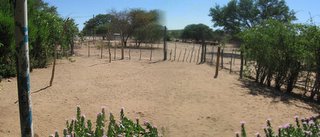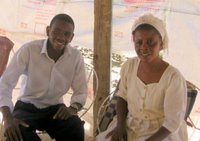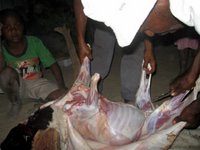My sister
I wrote parts of this a while ago. I've been trying to decide what to
do with it. I decided that it was important enough to share.
My host sister is an AIDS orphan. Her name is Daconja and she is
about six years old (I never managed to figure out exactly how old she
was). Her hair is cut short like a boy, but her eyelashes curl
femininely and she is very beautiful. She liked copying me. When I
would write my lesson plans she would sit beside me with a piece of
paper out of my notebook and one of my mechanical pencils and make
short vertical lines and circles, imitating my writing. One day I was
brushing my teeth before school and she was watching intently. She
went into another room and came back with a toothbrush and started
brushing her teeth. She played with my hair and she thought it was
hysterical that the braids don't stay in my straight, smooth hair. It
kills me that she will have to grow up without a mother.
I didn't expect that AIDS would affect me this much. I guess I was
just naïve enough to believe that I could come to a country with a
nearly 25% HIV/AIDS rate and I would be immune to the effects. All of
a sudden statistics devastate me. Do you know how they get the
HIV/AIDS rate in Namibia? They test all of the pregnant women who
come in to the clinic. The statistics mean that one out of four or
one out of five pregnant women are infected. The rate in the general
population is probably higher. One of the biggest risk factors for
HIV for women in Namibia is being married. Many women become infected
by their only sexual partner - their husband. By 2020 it is estimated
that 1/3 of Namibian children will be orphans like my sister. They
aren't numbers any more; they are my learners, my friends, and my
family.

Daconja (the one she is writing about), Dorencia, and Dorien
-Amy's host family's children
Daconja is actually not related by blood or marriage to my family.
She came to my house because she had nowhere else to go. My host
mother, Tollitjie, knew her mother from the church soup kitchen. When
Daconja's mother was dying she called for Tollitjie and begged her to
take Daconja. The father wasn't in the picture and when the woman's
family found out that she had AIDS they had abandoned her. Tollitjie
finally agreed to take Daconja. She was the one who had to tell her
that her mother was dead. Apparently this happened the week before I
moved in with the family.
Namibia has the third highest AIDS rate in the world. The strain of
HIV that they have here is the most virulent and easily transmitted
strain. I think the worst part is that the rate keeps going up which
means that the epidemic hasn't even hit the peak. If people stopped
getting infected tomorrow, there would still be huge death rates for
years to come and they won't stop getting infected tomorrow. Tomorrow
more people will become infected. There is a coffin shop in downtown
Omaruru. It's obviously doing good business because it's one of the
biggest and fanciest stores in the town.
In the middle of my home stay Daconja's maternal grandmother showed up
and insisted that she go with her. Daconja didn't want to go, but
Tollitjie was afraid that the police would side with the grandmother.
I didn't understand what was happening. My mother left with Daconja
and when she came back, she was alone. That was the last time I saw
her. I later found out that she has a ten-year-old brother who was
furious that the grandmother had taken her and threatened to go to the
police. "Where were you when my mother had AIDS?" He asked. "Where
were you when she died? Tollitjie was there. You weren't."
Stigma is a huge problem in Namibia.
People who have AIDS can be disowned from their families. It's illegal,
but sometimes they are fired from their jobs. Some people even
use God as a weapon; stating that they are receiving just punishment for their sins.
The stigma doesn't extend only to the infected person. In an ultimate act of
injustice, AIDS orphans, some of the helpless victims of the epidemic,
are also often burdened with stigma. They are bounced from house to
house, treated poorly by some members of their own family, and
insulted and taunted by their peers. Sometimes people refuse to touch
AIDS patients or orphans; convinced that they can get the disease
simply by touching the person.
Daconja was a skinny girl. They kept telling me how she had fattened
up since she had come to the house. Poverty is a huge problem for
those affected by AIDS and sometimes it's difficult to get enough food
to eat, especially if the head of the household is sick. I figured
that was what had happened in Daconja's family. But then, a day
before I left my home stay family, my host mother went to Otjibingwe,
where Daconja's grandmother lived. She checked in on Daconja and when
she got back she was very angry.
"I tell her that she should take Dacon to the clinic, but she says
huh-uh. I tell her that I'll take her if she wants, but she says
Dacon doesn't need to go to the clinic," my host mother said obviously
seething with anger.
"Is Daconja sick?" I asked naively. Tollitjie gave me a significant
look. That was when I realized that Daconja was HIV-positive.
There is no more turning my head. There is no more preferring not to
know. I can't let someone else deal with it anymore. HIV isn't
Namibia's problem. It's my problem. It's my war. The thing is that
it's not a very hopeful battle. My sister will die of AIDS. Even if
they came up with a cure, it wouldn't make its way here for quite a
while. She will not live to be an adult. People keep getting the
disease and it keeps killing people. There are surveys that say that
90% of Namibians know how HIV is spread, but the infection rate still
keeps going up. It's a very helpless feeling, knowing that there is
not much that I can do.
One day I went to church choir practice. We sang the usual songs in
KhoeKhoe and I faked my way through as usual. At the end we gathered
up our things and walked out into the cool, moonlit street. We sang
loudly, the four part harmonies echoing down the street. As I walked
home through the broken-glass filled ditch, clutching my host mother's
arm to try to avoid falling on the glass, I asked her about the last
song.
"It's a song for the AIDS people." She told me. "It means, "Where did
HIV come from? We don't know. What can we do about HIV? We can't
think of anything. Who can help the AIDS people? Only God can help them. Help them, God."
That's what I think.
I also can't think of much to do.
Help them, God.
And help me.
And help Daconja.






















